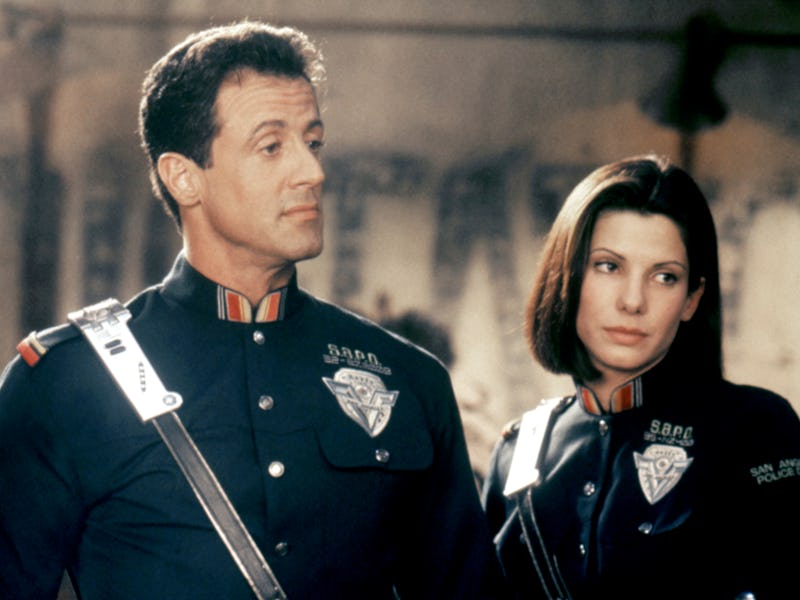Sylvester Stallone’s Ridiculous Time Travel Romp is Still a Blast to Watch Today
Two of the 1990s' biggest action stars face off in a future full of smart satire.

Everyone knows about the three seashells. That even includes people who’ve never seen the 1993 sci-fi action-comedy featuring Rob Schneider’s greatest line delivery, as he snickers over revived 1990s-era cop John Spartan (Sylvester Stallone) attempting to understand why the bathrooms of 2032 lack toilet paper. Everyone in the future knows what the three seashells are for... except John Spartan.
The running joke is just one example of the inspired humor in Demolition Man, which brought middling critical and box office returns in 1993 but has since proved remarkably prescient. It’s also held up remarkably well as an entertaining, well-crafted piece of sci-fi, only descending into rote ’90s action beats in its finale. It features some of Stallone’s best work in both action and comedy, along with a delightfully unhinged performance from Wesley Snipes as villain Simon Phoenix and a breakout role for Sandra Bullock as Spartan’s future cop partner Lenina Huxley.
Beginning in the far-flung future of 1996, Demolition Man opens with what is essentially a bombastic action movie parody, introducing Spartan as Los Angeles’ toughest, least rule-following cop, who ignores orders so he can track down master criminal Phoenix. The title refers to Spartan’s well-deserved nickname, as by the end of the opening sequence he’s blown up an entire compound where Phoenix was holding civilians hostage.
Blamed for the deaths of those hostages, Spartan ends up in a high-tech prison alongside Phoenix, both sentenced to be cryogenically frozen for decades while they’re rehabilitated with neural implants. Cut to 2032, when Los Angeles has been subsumed by the megalopolis of San Angeles, and crime has been eradicated, along with any kind of even remotely naughty behavior. Cops like Huxley spend their time tracking down people who break curfew or utter too many swear words, so when Phoenix somehow breaks out of the cryo-prison and goes on a murder spree, the police force is entirely unprepared.
Wesley Snipes gives a delightfully unhinged performance as villain Simon Phoenix.
That’s where Spartan comes in, revived so he can resume his pursuit of Phoenix. After 36 years in deep freeze, Spartan is adrift and baffled by the world of 2032. It’s no coincidence that Spartan’s new partner shares a last name with the author of dystopian classic Brave New World, and it’s soon revealed that the seemingly serene San Angeles hides a seedy underbelly.
The social commentary in Demolition Man is mild, and the various credited and uncredited screenwriters, including Heathers’ Daniel Waters, don’t let satire get in the way of the action. Still, the movie is full of sharp, smart humor, especially in Huxley’s obsession with 20th-century culture. Her apartment is cluttered with tchotchkes like the interior of a chain restaurant, and she frequently mangles old-fashioned slang. Bullock makes Huxley’s enthusiasm for finally encountering real crime seem wholesome, just as when she enthusiastically propositions Spartan for sex.
You don’t have to worry about averting your eyes during this sex scene.
Sex in 2032 mainly involves donning virtual-reality headsets, one of the many future developments that Demolition Man accurately anticipated. From widespread video-conferencing to a celebrity being elected president — that’s Stallone’s fellow action icon Arnold Schwarzenegger, of course — the future of Demolition Man has plenty in common with the future that was still on its way in 1993.
San Angeles is a sanitized authoritarian paradise, where everything from smoking to spicy food has been outlawed, and Demolition Man makes plenty of jokes at the expense of what was then dubbed political correctness. But Spartan isn’t just a manly savior bringing back red-blooded American values. His macho bluster also serves as a defense mechanism, and he warms to Huxley’s sensitivity just as she embraces some of his recklessness. “This is how insecure heterosexual males used to bond,” she observes to her colleague as Spartan and one of his former co-workers lob insults at each other.
John Spartan’s confusion about the future makes for much of the comedy.
Just as Waters’ sophisticated snark shines through in the writing, director Marco Brambilla brings a bit of his avant-garde sensibilities to the visuals, especially in the trippy scene of Spartan and Huxley’s VR sex. Brambilla was hired for Demolition Man based on his work in TV commercials, but he made only one more feature film before leaving Hollywood for a new career in fine art, creating video installations that comment on cinematic imagery. Demolition Man is far from an art film, but there’s clear artistry in its construction, as an action movie that reflects on the nature of action movies.
The funniest running joke involves machines that automatically issue fines for swearing, which are introduced early and continue functioning in nearly every scene that takes place in public. Spartan and Phoenix freely drop curse words, and the machines beep in the background, which is far funnier than constantly drawing attention to them. The filmmakers know when to let a joke simmer, and when to bring it back to the forefront for a stronger punchline. That’s the kind of finesse that makes Demolition Man worth revisiting, even as its future setting comes closer to being part of the past.
Demolition Man is streaming on Max until August 31.